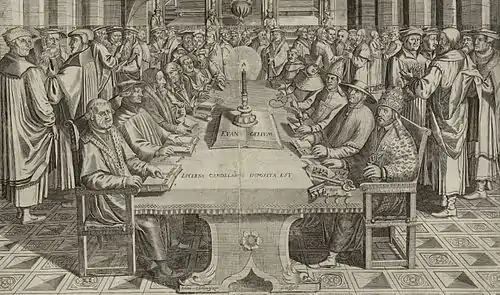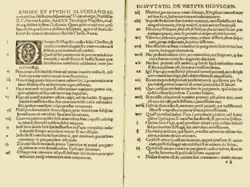Protestant Reformers
Protestant Reformers were those theologians whose careers, works and actions brought about the Protestant Reformation of the 16th century.

| Part of a series on the |
| Reformation |
|---|
 |
| Protestantism |
| Part of a series on |
| Protestantism |
|---|
 |
|
|
In the context of the Reformation, Martin Luther was the first reformer (sharing his views publicly in 1517), followed by people like Andreas Karlstadt and Philip Melanchthon at Wittenberg, who promptly joined the new movement. In 1519, Huldrych Zwingli became the first reformer to express a form of the Reformed tradition.
Listed are the most influential reformers only. They are listed by movement, although some reformers (e.g. Martin Bucer) influenced multiple movements.
For a full and detailed list of all known reformers, see List of Protestant Reformers.
Notable precursors
Throughout the Middle Ages, there were a number of Christian sects, cults and movements that sought a return to the purity of the Apostolic church and whose teachings foreshadowed Protestant ideas.[1] Some of the main groups were: Paulicians (6th to 9th centuries); Tondrakians (9th to 11th centuries); Bogomils (11th century); Petrobrusians (12th century); Henricans (12th century); Brethren of the Free Spirit (13th century); Apostolic Brethren – later known as Dulcinians – (13th to 14th centuries); Neo-Adamites – including Taborites, Picards and some Beghards – (13th to 15th centuries); Men of Understanding (15th century).
Some of those whose doctrines influenced later Protestant movements were:
Arnoldist
- Arnold of Brescia (1090-1155)
- other early Arnoldist reformers
Waldensian
- Peter Waldo (1140-1205)
- other early Waldensian reformers
Lollard
- John Wycliffe (1320-1384)
- other early Lollard reformers
Hussite
- John Hus (1369-1415)
- Jerome of Prague (1379-1416)
- Petr Chelčický (1390-1460)
- other early Hussite reformers
Other
- Girolamo Savonarola (1452-1498)
- Tomáš Štítný ze Štítného (1333-1409)
- other early independent reformers
Magisterial Reformers
There were a number of key reformers within the Magisterial Reformation, including:
Lutheran
Reformed
Arminian
Unitarian
Second Front Reformers
There were also a number of people who initially cooperated with the Radical Reformers, but separated from them to form a "Second Front", principally in objection to sacralism. Among these were:
Counter Reformers
Roman Catholics who worked against the Protestant Reformation included:
See also
- List of Protestant Reformers (alphabetical)
- Protestantism in Germany
References
- Broadbent, E.H. (1931). The Pilgrim Church. Basingstoke: Pickering & Inglis. ISBN 0720806771.
Further reading
- George, Timothy. Theology of the Reformers. Nashville, Tenn.: Broadman Press, 1988. N.B.: Comparative studies of the various leaders of the Magisterial and Radical movements of the 16th century Protestant Reformation.